Those suffering from severe stress symptoms will likely do anything they can to try and combat the unpleasant effects of constant anxiety. If lifestyle changes don’t work and you aren’t able to address the cause of the stress (stressor), then you might begin looking further afield to try and find alternative remedies or even medications that can help.
One such alternative remedy is acupuncture for stress. But does it really work? And if so, how?
An Introduction to Acupuncture
Acupuncture is a component of traditional Chinese medicine and involves the use of small needles in order to stimulate pressure points throughout the body, often with the combined application of heat, pressure and light.
These needles are then thought to facilitate the healthy flow of ‘chi’ (the Chinese conceptual life force) through channels in the body called meridians. It is important to recognize that neither the existence of chi or the meridians has been proven through scientific means, making acupuncture a form of ‘pseudoscience’.
Acupuncture is used to treat a variety of different conditions which include everything from depression and stress to pain, addiction and more. Acupuncture is generally used as an adjunct to other forms of treatment within TCM (Traditional Chinese Medicine).
The research surrounding acupuncture’s effectiveness is inconsistent at best with no conclusive correlations demonstrating its effectiveness in any capacity (1).
That said, one recent study has demonstrated that acupuncture may be able to reduce levels of neuropeptide Y (NPY) in the hippocampus of adult rats (and thus presumably humans). This protein is linked with stress and depression and so provides a possible mechanism for action that might explain the benefit shown in some studies (2).
How Acupuncture for Stress Works
With all that said, is there any value to using acupuncture for stress?
What positive results have been found seem to be ‘non-specific’ in nature. This means that it’s not actually the needles themselves that are beneficial but rather the relaxing environment, the human interaction, the chance to talk and the placebo effect. The placebo effect describes the tendency for many ailments to improve when the patient believes that they will. The most common example of this is the ‘sugar pill’ which can miraculously cure everything from phobias to psoriasis when the patient believes they’re receiving something else.
What about NPY? Rather than offering support for acupuncture for stress, this actually provides more support for it having only ‘non-specific’ benefit. That’s because tactile stimulus generally can alter levels of NPY, especially with such things as sports massage. Interestingly there also seems to be sex differences in the hormonal responses to tactile stimulus (3).
In other words then, the only evidence in support for acupuncture for stress suggests that it is the attention and stimulus that provides the benefits – not the actual needles themselves.
So can acupuncture for stress be effective? Perhaps, but a massage would be considerably more effective and provide many additional benefits.




